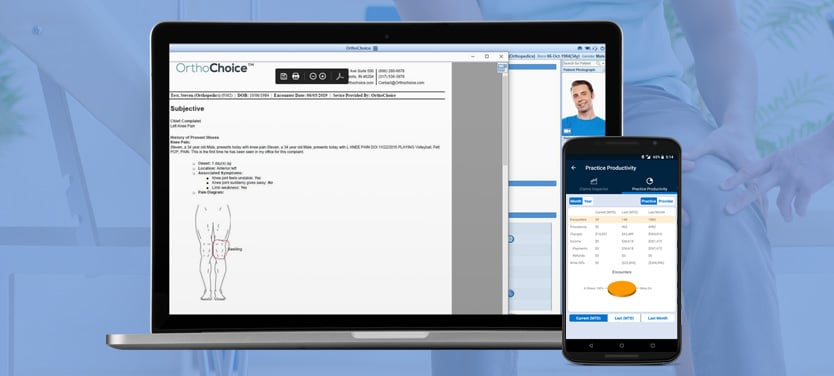
7 Features Your Orthopaedic EHR Should Have
Not every Orthopaedic EHR is the same. Ortho providers need a specialty-specific Electr...
May 29, 2020
Electronic Health Records changed how practices operate forever. With features that protect patient data, help providers work more efficiently, and streamline billing processes, the EHR has improved how doctors do medicine. As the technology of the EHR continues to develop, providers are now encountering the benefits of specialized technology, encouraging even more growth in the industry. For Orthopaedic providers, a specialty-specific Orthopaedic EHR has the ability to increase efficiency, streamline billing processes, provide quality reporting, and work seamlessly with the other technology at your practice. Below are 4 reasons your practice should invest in a specialty-specific Orthopaedic EHR.
Features of an Orthopaedic EHR:
1) Customized Workflow
A custom workflow in your Orthopaedic EHR gives you the power and flexibility you need to accomplish your best and most efficient work. Each provider in your practice works differently and every patient encounter is unique. With custom workflow and template features, your Orthopaedic EHR enables each member of your team to tailor their workflow to their specific needs. When an EHR fails to offer this flexibility, your team then has to figure out how to change how they work to fit the technology. This should never be the case. With the ability to work their own processes in a way that makes the most sense to them, each member of your team will be able to work at their best pace and accomplish the most in their day. With customizable templates, each patient encounter gets the unique attention it deserves, improving the accuracy of the information in every chart, and clinical decision making down the road.
2) Integrated Billing and PM software
Integrated billing and practice management software is a must-have in any EHR. With an Orthopaedic EHR from a quality vendor, your software will work seamlessly with your billing technology to make sure your practice sees the quickest possible payer reimbursement. Integrated billing technology in your Orthopaedic EHR helps your providers complete necessary billing tasks within the EHR software, optimizing each step of the process for peak efficiency and data accuracy, therefore, increasing clean claims and reducing denials.
Integrated PM software enables faster scheduling, a reduction in data errors, and an increase in the accuracy of all patient data. PM/EHR integration helps your patients view all available appointments in their patient portal and schedule online, helping them find the best visit for them. Digital patient intake also helps patients enter their PHI directly into their chart, giving providers the most updated and accurate information possible at all times.
3) Ortho-Specific Reports/Dashboards
An Orthopaedic EHR also equips providers with the reporting tools and technology they need to make quick and accurate clinical decisions throughout their day. Ortho-specific reports and dashboards help providers quickly access patient health information, vitals, and test results in order to streamline decision-making processes. With this feature of an Orthopaedic EHR, providers can visually track patient vitals and identify trends or progress regarding their health easily and efficiently. This tool ensures that your team is always able to work quickly without sacrificing the quality of their decisions or the information they are working with at any given moment.
4) Interoperability
Lastly, your Orthopaedic EHR should offer interoperability features to help your practice securely exchange, interpret, and utilize health data within your practice and with other providers. Interoperability allows your team to exchange data seamlessly with one software to another. This comes in handy when you are accepting new patients and need access to their chart within a different healthcare organization, or wish to see tests completed by a different provider. Interoperability ensures that all providers that a patient is working with have access to all of that patient’s data, improving the quality of care the individual is receiving across the board. This is especially useful in a specialized Orthopaedic EHR, helping providers who work with patients across all different health networks.
To learn more about an Orthopaedic EHR that could help your practice, click here.